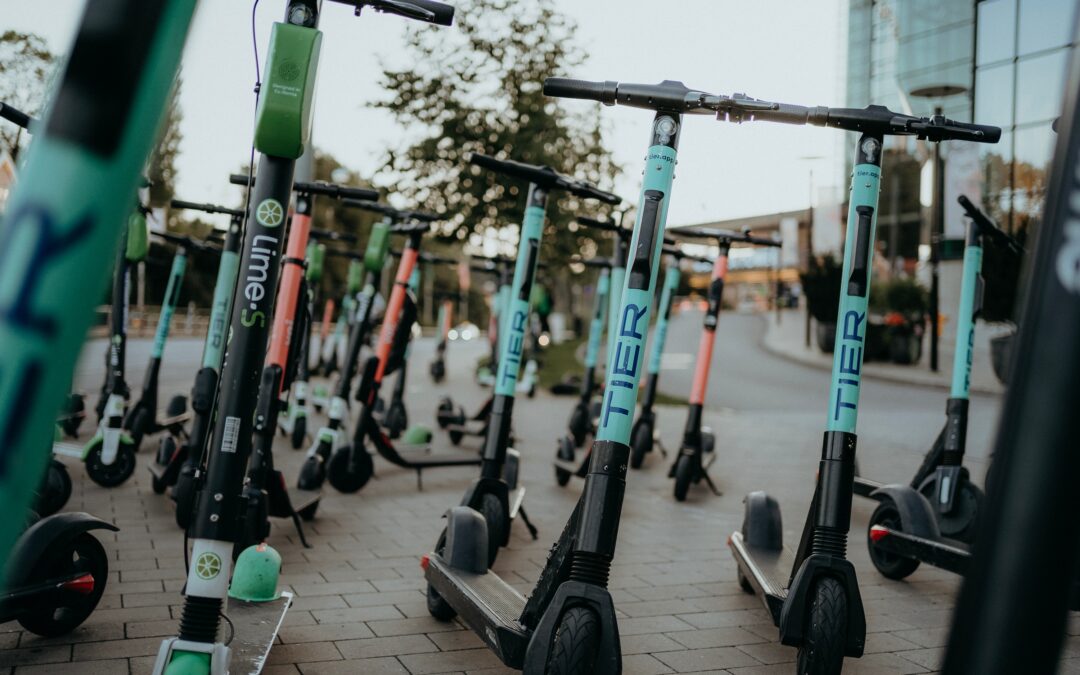Poland’s police force has launched a campaign reminding the public of legal requirements for using electric scooters, including a warning that riding or parking them on pavements can be illegal.
The move follows the recent release of the first-ever official annual figures for accidents involving e-scooters, which showed that in 2022 they resulted in hundreds of injuries and three deaths. Some activists have called for the vehicles to be banned from Polish cities, a step recently approved by Parisians in a referendum.
Akcja „Jednośladem bezpiecznie do celu" dotyczy także użytkowników hulajnóg elektrycznych. Dzięki firmie #ScreenNetwork ten przekaz emitowany jest na ekranach LED rozmieszczonych https://t.co/vKeOm6mq7l. przy głównych ciągach komunikacyjnych, dworcach itp.https://t.co/8JnOXxiMDR pic.twitter.com/R6tzoFptPu
— Polska Policja 🇵🇱 (@PolskaPolicja) May 13, 2022
“We want to remind you that an electric scooter is a vehicle and its user is a driver. This comes with both privileges and responsibilities,” wrote the police on Saturday, launching the new campaign.
They remind riders that, under rules introduced in 2021, they are obliged to use a cycle lane if one is available. If not, then they must use the road if it has a speed limit up to 30 km/h ( mph).
If neither of those options is available, only then can they use the pavement, and they must do so “driving at a speed similar to that of pedestrians, giving way to pedestrians, and not hindering their movement”.
Fines for failing to follow the rules can range between 50 zloty and 500 zloty, depending on the type of offence.
For more on Poland's new regulations on the use of electric scooters, see our previous report https://t.co/TcrfPQocfr
— Notes from Poland 🇵🇱 (@notesfrompoland) May 20, 2021
The police also note that, for children aged 10 to 18, the same rules apply as for bicycles, meaning they must have a licence in order to ride an e-scooter (either a karta rowerowa or a category AM, A1, B1 or T driving licence). Those aged under 10 are banned from riding them in public places, even if supervised by an adult.
It is prohibited to ride an e-scooter under the influence of alcohol or other intoxicating substances; to use one to transport other people, animals or cargo; or to pull or tow other vehicles with an e-scooter. Using a phone while driving one is also banned.
Electric scooters must be parked in a designated place if one is available. If not, they can be left on the pavement only if they are positioned as close as possible to the edge furthest from the road, parallel to that edge, and leaving a free width of at least 1.5 metres for pedestrians.
In Kraków, Poland’s second-largest city, a cross-party group of local councillors last year launched an initiative to ensure operators enforce the parking rules amid a wave of complaints from residents about scooters blocking pavements.
Rada Miasta Krakowa weźmie się za operatorów hulajnóg https://t.co/CfjjWL5gXM pic.twitter.com/n1RyICmsLm
— LoveKraków.pl (@lovekrakow) November 2, 2022
In addition to such grievances, there are also concerns over the threat of e-scooters to public safety, with reports that hundreds of accidents involving the vehicles have been taking place annually, often resulting in serious injuries or even death.
Because the new regulations introduced in 2021 officially classified e-scooters as vehicles for the first time, that means 2022 was the first year for which the police collected and published statistics on accidents involving them.
The figures, released last month, showed that there were 424 such accidents involving e-scooters. That was twice as many as recorded for motorbikes up to 125cc, even though there are estimated to be more such motorbikes than e-scooters.
Those 424 e-scooter accidents resulted in 421 injuries (155 of them deemed serious) and three fatalities. Sixty of them involved hitting pedestrians, 37 involved cyclists, and in 58 cases the scooter drivers were found to be under the influence of alcohol.
Paryż ma dość elektrycznych hulajnóg – zaśmiecają miasto i powodują wypadki. Sprawdzamy, jak jest w Polsce https://t.co/bxejHe2fSI
— Gospodarka – Polskie Radio (@Gospodarka_PRSA) April 4, 2023
Yesterday, police in the town of Serock, just north of Warsaw, arrested four men driving e-scooters while intoxicated. They are facing fines of up to 2,500 zloty, reports local newspaper Gazeta Powiatowa.
Last week in Kety, a town south of Katowice, a 52-year-old man had to be hospitalised by an air ambulance after being knocked unconscious when falling off an e-scooter, reports Radio Kraków. Afterwards, the police appealed to riders to wear helmets, even though it is not a legal requirement.
In March this year, police in Wrocław caught a man riding an e-scooter almost 40 km/h, which is double the permitted limit. He was fined 200 zloty, reports the Rzeczpospolita daily.
The annual number of deaths on Poland’s roads fell below 2,000 last year for the first time on record.
Police link the drop to tougher new road safety measures, including higher fines for speeding https://t.co/x2RjYioYnO
— Notes from Poland 🇵🇱 (@notesfrompoland) January 6, 2023
Main image credit: Jonas Jacobsson/Unsplash

Daniel Tilles is editor-in-chief of Notes from Poland. He has written on Polish affairs for a wide range of publications, including Foreign Policy, POLITICO Europe, EUobserver and Dziennik Gazeta Prawna.




















